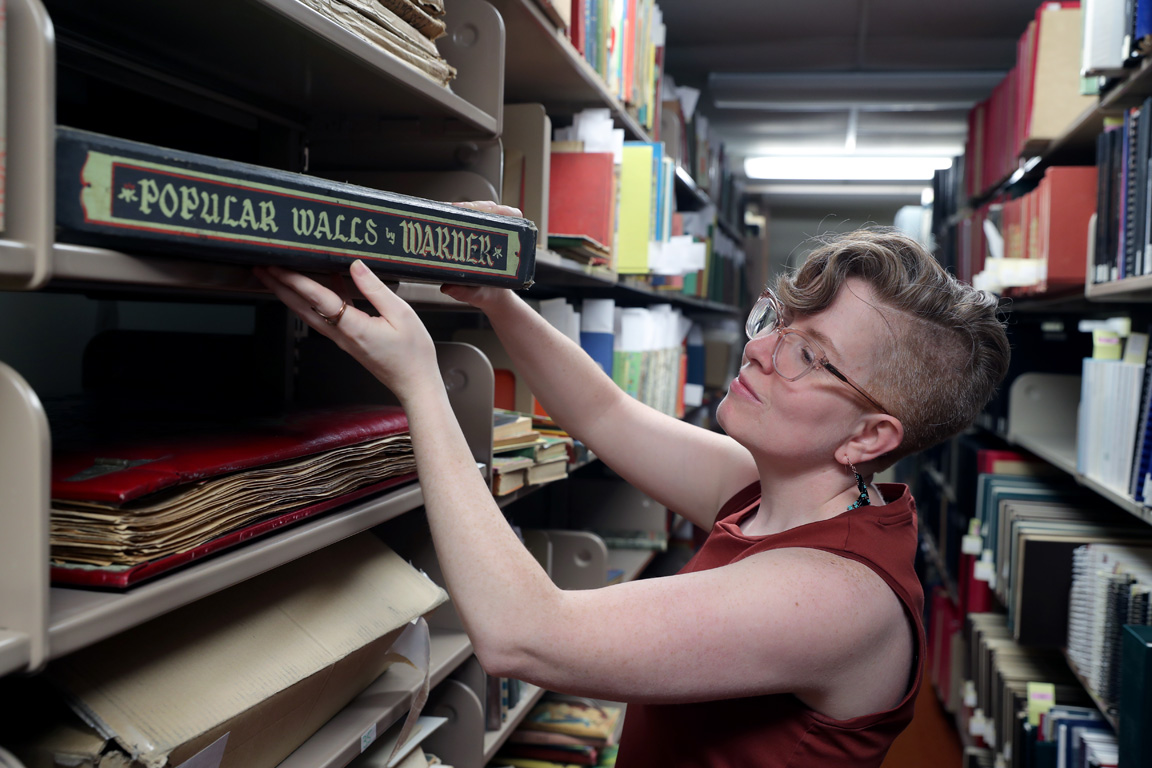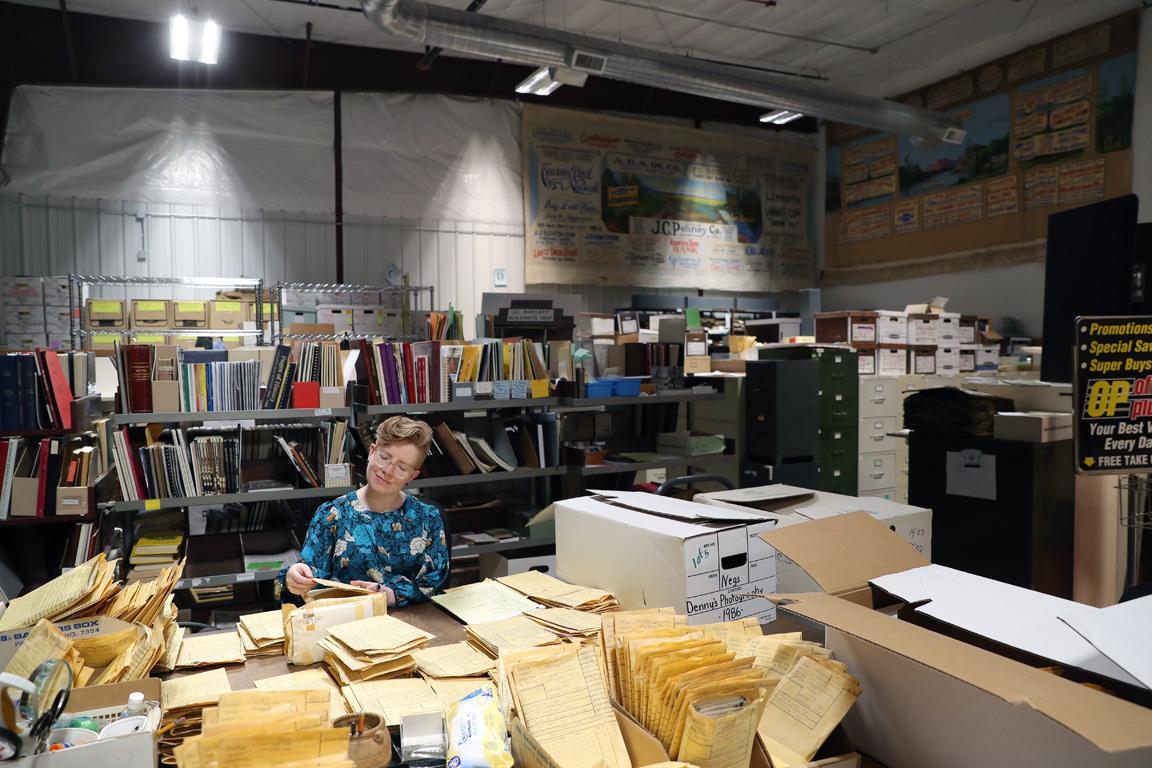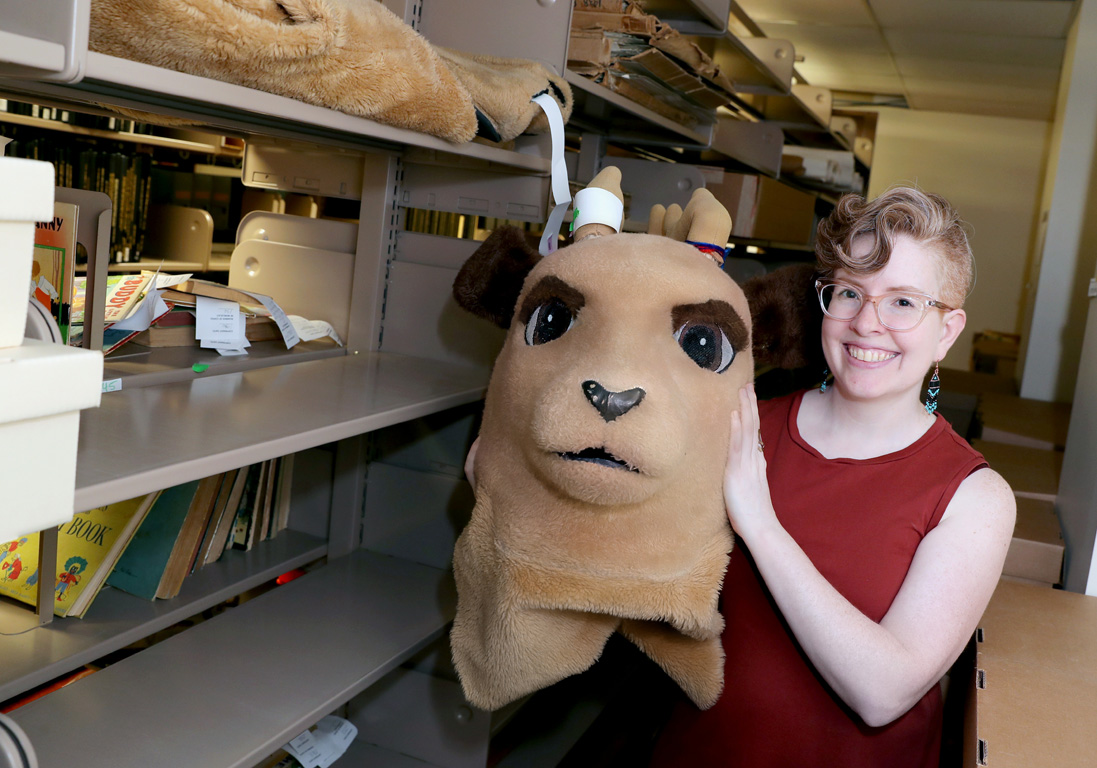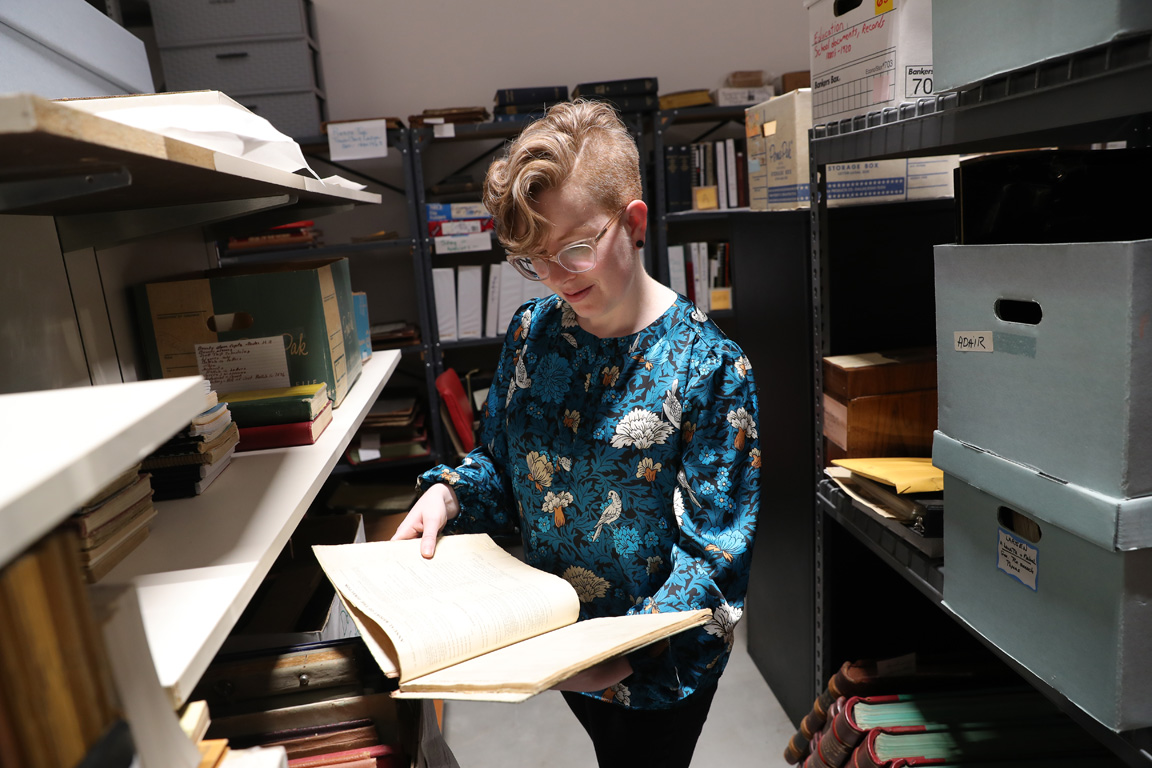
VIEW THE 2023 NEW FRONTIERS MAGAZINE FEATURING WEISSE AND OTHER UNK FACULTY
By KIM HACHIYA
For UNK Communications
KEARNEY – Families, organizations and universities value their history and stories.
It’s why genealogy classes and websites flourish. Why “decluttering and rehoming your stuff” websites also flourish.
But for archivists, “boxes of stuff” can be a tantalizing gold mine that helps reveal truths and unlock stories. An archivist for a university has the happy, and sometimes emotionally fraught, task of helping an institution preserve and tell its stories, truths and history.
Laurinda Weisse has been leading that work for the University of Nebraska at Kearney since 2014.
As UNK’s first professionally trained archivist, her first job when arriving on campus was to survey the collection and develop a system of identifying, cataloging, describing and maintaining items in the 1,400 linear feet of materials. (Archivists and others describe their holdings in terms of the length – or linear feet – that the boxes occupy on shelving.)
Unlike museums, which often have discrete items such as pottery or fossils that do not circulate among the public, or libraries, whose items are mostly available for public use, many archives are quasi-public – things are available for public use for research and other activities. But first, you must know what’s there. Determining what’s in a collection is a duty of an archivist.
An archivist, Weisse said, is a specialist librarian for unique or rare materials who helps connect people to those materials to fulfill users’ interests and research needs. She finds the latter part of the job – connecting people with materials – the most fulfilling.
For instance, UNK holds one of the few extant copies of sheet music for “Song of the Great Blizzard: Thirteen Were Saved,” which commemorates the heroism of a Nebraska teacher who led her students to safety in the infamous Blizzard of 1888. Miss Minnie Freeman, known as Nebraska’s Fearless Maid, was the teacher who was immortalized by William Vincent in a popular song. Recently, a European composer wanted to use the music for a work he was creating, and UNK was able to provide that via its digital repository. Building and digitizing the archives have been a high priority for Weisse.

IMMIGRANT VOICES SHARED
UNK’s archives have many other 1888 Blizzard materials due to UNK’s roots as a “normal school,” a college focused on educating teachers. The collections are particularly rich in materials about rural and one-room schools, and Weisse has presented those items.
“It’s a true gold mine of data and stories – oral histories,” she said. She and others are developing access points for scholars who are interested in the topic of rural schools as their numbers diminish. The Country School Legacy Project offers insight into rural communities and the people who live in them.
With colleagues Michelle Warren, associate professor of Spanish, and Jacob Rosdail, associate professor of communication, Weisse created “Coming to the Plains,” an oral history project that looked at the immigration of Latinos to the Great Plains. The project launched in 2017 and was a way to attach faces and names to the often anonymous yet vilified immigrants from Mexico, El Salvador, Honduras, Colombia, Guatemala and the Dominican Republic who now live in central Nebraska.
The goal was to highlight their stories, and many of those interviewed for the project were families of UNK students who also participated in collecting the stories. Twenty individuals were interviewed and filmed for “Coming to the Plains,” and their stories ranged from frustrating to heartbreaking to uplifting, Weisse said. Decades-long waits for paperwork to be processed, racism and harassment, witnessing violence and deaths were among participants’ recurring themes. It was, she noted, often deeply emotional for her to listen to and analyze the stories, which often were told in Spanish, a language with which Weisse is conversant, although biliterate students led transcription and translation.
Weisse and colleagues wished to give voice to the participants and explore the region’s complicated relationship with immigration. She noted that 120 or more years ago, the region was “settled” by European immigrants, who built on lands once inhabited by Indigenous people. European immigrants also faced hardships along their journey to becoming Americans, and the stories told by contemporary Latino immigrants are similar, she said.
A traveling exhibit, banner displays and film comprise the project, which has been displayed at UNK, Lexington and Grand Island public libraries, Nebraska Wesleyan University, University of Nebraska at Omaha and Great Plains Art Museum.
RESHAPING HISTORICAL NARRATIVES
Weisse wants to center on the archive’s stories of marginalized or invisible people.
UNK’s archives, said Weisse, are the “official” voice of the institution and have historically reflected the experiences and priorities of those with power institutionally and socially. She is interested in exploring the experiences of women, people of color and those who identify as LGBTQIA. The queer perspective is of increasing interest, she said.
She is looking to talk to people she terms “queer elders” in rural communities and also capture stories about queer students’ experiences at UNK and other Nebraska institutions. Some of this material has informed presentations at the annual No Limits conference, an interdisciplinary student conference sponsored by the women’s and gender studies programs at UNK, UNO and the University of Nebraska-Lincoln.
This material could inform age-appropriate curriculum for diversity, equity and inclusion programs. She recognizes this can be interpreted as controversial but also notes its importance in validating all human experiences. Exploring these topics is critical to the academic freedom of a university, she said.
Currently, she is looking at a set of cabinet cards from the Santee Normal School that existed on the Santee Reservation in northeast Nebraska. Cabinet cards were the way photographs of people were displayed in the late 1800s. These cards, and some accompanying papers, were part of the collection from the school’s superintendent and his wife. They are a way to see how people at the school were depicted at the time.
“Indian Schools,” which operated from about 1880 to about 1940, were boarding schools where Indigenous children were sent, usually against their will and the will of their families, to be trained. These schools are now recognized as being inhumane and genocidal towards Native culture. At their worst, students were forbidden from speaking their languages or practicing their Native religions or rituals. Additionally, they endured harsh living conditions, including unheated dormitories.
The Santee school was unusual in that it was located on the reservation and students were allowed to speak their language. Interest in the Indian school experience is growing as Native families wish to rebuild their heritage and honor ancestors who lived, or died, at the schools.

UNCOVERING HIDDEN GEMS
Not every story in the UNK archive is sad, she notes.
The archive holds the collection of Calvin T. Ryan, a renowned professor of English at Kearney State College. Ryan saved all his correspondence, both outgoing and incoming, she said. Among the items: a letter he mailed to a girlfriend in which he dumped her, and her response.
She also found editions of a student publication, The Anti-Lope, a satirical newspaper that riffs on the actual student newspaper, The Antelope. The Anti-Lope featured a column called the Sextion that answered questions about sex, and in the mid-1980s sometimes featured truthful and useful information about HIV-AIDS, birth control and other topics.
Current projects for Weisse include building out the digital repository that will showcase the scholarly and creative work of UNK undergraduate and graduate students and UNK faculty. Digitally available journal articles, theses and dissertations advance scholarship as others build on published knowledge, so a digital repository is important, she said.
Recently, Weisse helped in the revival of a small regional business journal, the Mountain Plains Journal of Business and Technology. The journal is aimed at scholars and practitioners in business and technology but had fallen dormant. Weisse and others from UNK’s College of Business and Technology helped move its back issues to the repository and are again accepting and publishing articles.
With Weisse’s support, UNK has moved the Undergraduate Research Journal online – a change that greatly increased readership and usage. Weisse collaborated with the Office of Graduate Studies on the Graduate Review, a peer-reviewed online publication of work written by UNK graduate students across all disciplines. Weisse serves as editor-in-chief of the publication. She also presents occasional workshops on genealogy, affordable digitization of media such as VHS tapes, how to preserve family treasures, and other topics of interest to other archivists, librarians and the non-academic public. Her goal is to make preserving information, and archives, accessible to all.
And while the archives exist for a serious purpose, it does collect items some may find frivolous – carpet samples from the old library, a cheerleader’s outfit worn by a Kearney State College student, sports memorabilia.
Those items represent the broad story of UNK, Weisse said. And that’s just as important to the university as what some might consider more “serious” scholarship because they represent memories, stories and personal engagement.
LAURINDA WEISSE
Title: University Archivist and Digital Repository Manager, Calvin T. Ryan Library
Education: Bachelor of Arts in anthropology, history, Latin American, Caribbean and Iberian studies, University of Wisconsin Madison, 2010; Master of Science in Information in preservation of information, archives and records management, University of Michigan, 2013.
Years at UNK: Nine
Areas of Research/Specialization: University of Nebraska at Kearney history, Nebraska history, archives and primary source instruction, Latinx in Nebraska. “My scholarly and creative activity spans multiple disciplines. It is informed by my service and archives/library duties and strives to connect the past and the present to support teaching and learning while building a more representative and welcoming community.”
Courses Taught: Museums and Archives; Information literacy for criminal justice, English, family studies, interior design, geography, history, political science, psychology, social work, sociology and speech.
Recent Published Articles, Presentations, Exhibits: “Instant Archives: For Researchers on the Go,” Teaching with Archives & Special Collections Cookbook, 2021. “Archiving Latinxs on the U.S. Great Plains,” presentation at Society of Southwest Archivists, 2023. “Coming to the Plains: Latinx Stories of Immigration to Central Nebraska,” multiple presentations and exhibits at Grand Island Public Library, University of Nebraska at Omaha, Great Plains Art Museum, Lexington Public Library and Nebraska Wesleyan University, 2021-Present.
PHOTOS BY ERIKA PRITCHARD, UNK COMMUNICATIONS


